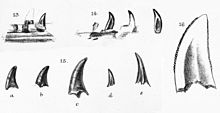侦察龙属
侦察龙属(学名:Nuthetes)是兽脚亚目恐龙的一属,目前被认为是疑名[1],是种小型掠食恐龙,可能属于驰龙科,身长约两公尺,体高约一公尺。生存于白垩纪早期的欧洲。
| 侦察龙属 化石时期:下白垩纪,
| |
|---|---|

| |
| 正模标本的下颌与牙齿 | |
无效状况
| |
| 科学分类 | |
| 界: | 动物界 Animalia |
| 门: | 脊索动物门 Chordata |
| 纲: | 蜥形纲 Sauropsida |
| 总目: | 恐龙总目 Dinosauria |
| 目: | 蜥臀目 Saurischia |
| 亚目: | 兽脚亚目 Theropoda |
| 科: | †驰龙科 Dromaeosauridae |
| 演化支: | †真驰龙类 Eudromaeosauria |
| 亚科: | †伶盗龙亚科 Velociraptorinae |
| 属: | †侦察龙属 Nuthetes Owen, 1854 |
| 模式种 | |
| 破坏侦察龙 Nuthetes destructor Owen, 1854
| |
| 异名 | |
|
Megalosaurus destructor (Owen, 1854) | |
命名
编辑模式种是破坏侦察龙(N. destructor),也是该属的唯一种,是由理查·欧文(Richard Owen)于1854年描述、命名的[2]。属名在古希腊文意为“侦查者”,意指侦察龙的牙齿类似现代巨蜥;而巨蜥的英文俗称是“Monitor lizard”,因为它们常抬起头来警戒四周的变化[3]种名在拉丁文意为“破坏者”,意指它们的牙齿适合撕裂、咬下猎物的肉体。根据理察·欧文的早期估计,侦察龙的体型接近孟加拉巨蜥[4]。
发现历史
编辑侦察龙的正模标本(编号 DORCM G913)是目前的唯一化石,是由业馀古生物学家 Charles Willcox 发现于英格兰多塞特郡的威尔登,属于拉尔沃思组(Lulworth Formation)的 Cherty Freshwater 段,地质年代属于下白垩纪的贝里亚阶中期。正模标本包含下颌齿骨碎片、及九颗牙齿,下颌碎片长三吋。正模标本一度被认为遗失,之后被发现于多塞特郡博物馆。后来有一组包含数颗牙齿、齿骨碎片的化石(编号 BMNH 48207)被发现,可能来自于体型较小的个体,目前也被归入于侦查龙属。
在1878年,理察·欧文将原本被命名为 Granicones 的一些爬行动物鳞片,改归类于侦查龙[5]。然而在2002年,一项关于这些鳞片的研究显示,这些鳞片可能是某些乌龟的四肢或尾巴皮内成骨,可能属于 Helochelydra 属或 Tretosternon 属[6]。
在2006年,法国夏朗德省发现的一颗牙齿(编号 CHEm03.537),也被归类于侦查龙的未命名种(Nuthetes sp.)[7]。
分类
编辑理查·欧文最初命名侦察龙时,曾将它们分类为蜥蜴的巨蜥科。之后,理察·欧文将它们改归类于鳄鱼[8]。1888年,地质学家理查德·莱德克(Richard Lydekker)发现这具化石其实属于一种恐龙。1934年,古生物学家 William Elgin Swinton 提出该化石是斑龙科的一个幼年个体。在1970年,Rodney Steel 将这些化石改归类于斑龙的一种,即破坏斑龙(Megalosaurus destructor)[9]。
在2002年,古生物学家安杰拉·米尔纳(Angela Milner)重新研究英格兰的兽脚类化石,认为侦查龙极可能是驰龙科的亚成年个体[10]。其他科学家研究了五个状态良好的牙齿标本,将其归类于侦查龙,也归类于驰龙科的伶盗龙亚科。侦察龙若是真的属于驰龙科,它将会是生存年代最早的驰龙科之一,同时也是第一个发现于英国的驰龙科恐龙[11]。
在2010年,数位古生物学家提出,侦察龙的牙齿与暴龙超科的原角鼻龙具有高度相似性,而较不类似伶盗龙亚科。同时也批评先前的研究,认为将侏㑩纪晚期到白垩纪早期的兽脚类牙齿归类于驰龙科并不适当,这些牙齿有可能属于暴龙超科的原角鼻龙科[12]。
参考资料
编辑- ^ T. R. Holtz, R. E. Molnar, and P. J. Currie. Basal Tetanurae. D. B. Weishampel, P. Dodson, & H. Osmólska (eds.) (编). The Dinosauria second edition. Berkeley: University of California Press. 2004: 71–110.
- ^ R. Owen. On some fossil reptilian and mammalian remains from the Purbecks. Quarterly Journal of the Geological Society of London. 1854, 10: 420–433.
- ^ Glut, D.F. (2002). Dinosaurs: The Encyclopedia Supplement 2. McFarland & Company, 686 pp. ISBN 978-0-7864-1166-5
- ^ Owen, R., 1861, "Monograph on the fossil Reptilia of the Wealden and Purbeck formations. Part V. Lacertilia (Nuthetes, etc.)", The Palaeontological Society, London 1858: 31-39
- ^ Owen, R., 1878, "On the fossils called 'granicones'; being a contribution to the histology of the exo-skeleton in 'Reptilia'", Journal of the Microscopical Society, 1: 233-236
- ^ Barrett, P. M., Clarke, J. B., Brinkman, D. B., Chapman, S. D., and Ensom, P. C., 2002, "Morphology, histology and identification of 'granicones' from the Purbeck Limestone Formation (Lower Cretaceous: Berriasian) of Dorset, southern England", Cretaceous Research, 23: 279-295
- ^ Pouech, Joane; Mazin, Jean-Michel and Billon-Bruyat, Jean-Paul, 2006, "Microvertebrate biodiversity from Cherves-de-Cognac (Lower Cretaceous, Berriasian: Charente, France)", In: 9th International Symposium, Mesozoic Terrestrial Ecosystems and Biota, Manchester 2006, Abstracts and Proceedings volume. p.96-100. View this article online (页面存档备份,存于互联网档案馆)
- ^ R. Owen. Monograph on the fossil Reptilia of the Wealden and Purbeck formations. Supplement no. IX. Crocodilia (Goniopholis, Brachydectes, Nannosuchus, Theriosuchus, and Nuthetes). The Palaeontographical Society. 1879, 1879: 1–19.
- ^ R. Steel. Part 14. Saurischia. Handbuch der Paläoherpetologie. Stuttgart: Gustav Fischer Verlag. 1970: 1–87.
- ^ Milner, A. (2002). "Theropod dinosaurs of the Purbeck Limestone Group, southern England." In: Milner and Batten (eds.). Life and Environment in Purbeck Times. Special Paper in Palaeontology, 68(268): 191-201.
- ^ Sweetman, S.C. (2004). "The first record of velociraptorine dinosaurs (Saurischia, Theropoda) from the Wealden (Early Cretaceous, Barremian) of southern England." Cretaceous Research, 25(3): 353-364. doi:10.1016/j.cretres.2004.01.004
- ^ Rauhut, Oliver W. M.; Milner, Angela C.; and Moore-Fay, Scott. Cranial osteology and phylogenetic position of the theropod dinosaur Proceratosaurus bradleyi (Woodward, 1910) from the Middle Jurassic of England. Zoological Journal of the Linnean Society. 2010, 158 (1): 155–195. doi:10.1111/j.1096-3642.2009.00591.x.
外部链接
编辑- 恐龙博物馆──侦察龙
- Extensive description (页面存档备份,存于互联网档案馆) from the Milner paper, on the Dinosaur Mailing List.
- Nuthetes in the Dinosaur Encyclopedia, described as a lizard (页面存档备份,存于互联网档案馆)
- Described as a dromaeosaurid